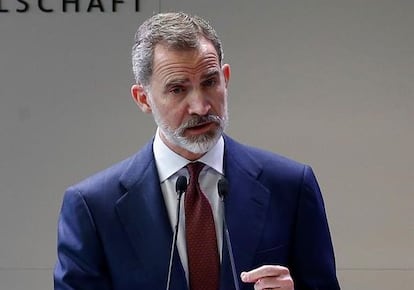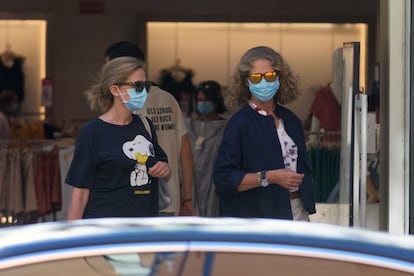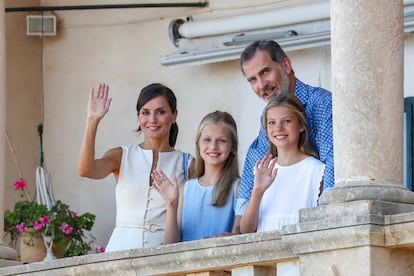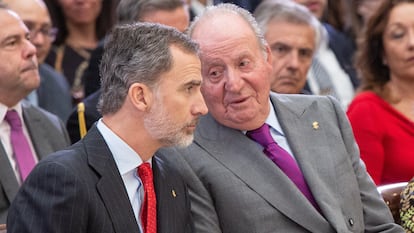Spain’s King Felipe VI struggles to repair tarnished image of royal family
The scandal over the alleged financial irregularities of his father, Juan Carlos I, has been compounded by his sisters’ decision to jump the Covid-19 vaccine line. Can the monarch fix the damage?

When Spain’s emeritus king, Juan Carlos I, abdicated the throne on June 2, 2014, he handed his son Felipe two titles: head of state and head of the Spanish Royal Household, the dynasty of the House of Bourbon. As head of state, King Felipe VI was forced to deal with the end of Spain’s two-party system, which began to break down with the elections for the European Parliament in May 2014. Since then, the political instability has continued, with Spain holding four general elections between 2015 and 2019. The Catalan separatist movement has presented another challenge, with the unauthorized referendum on independence on October 1, 2017, prompting King Felipe to make a public call for unity.
As head of the Spanish Royal Household, King Felipe has faced different challenges. When he ascended to the throne, the monarch wanted to turn the page on the numerous scandals that had tarnished the image of his father’s reign, in particular, the graft case known as “Nóos,” in which Felipe’s brother-in-law Iñaki Urdangarin and his sister Cristina de Borbón were facing corruption charges. While Cristina escaped punishment, Urdangarin ended up in prison for embezzlement, among other charges. He is still serving his sentence.
In a bid to restore the Royal Household’s image, King Felipe introduced a series of measures aimed at preventing such scandals in the future: a strict code of conduct for members of the royal family, greater transparency in the financial dealings of La Zarzuela palace, the seat of the Royal Household, and a ban on accepting excessive gifts. But Felipe’s most drastic decision was to reduce the members of the royal family to six: his parents, himself, his wife and their two daughters. His sisters, brothers-in-law, nieces and nephews were left out of the family.
But when the digital daily El Confidencial revealed last Tuesday that Felipe VI’s sisters, the ‘infantas’ Elena and Cristina, had received the Covid-19 vaccine ahead of their turn while on a trip to Abu Dhabi to visit their father Juan Carlos I, all eyes turned to La Zarzuela. Reminding the public that the infantas were no longer members of the royal family was of no use. Nor did it help to confirm that neither King Felipe, Queen Letizia or their two daughters Leonor and Sofía had been vaccinated, and that they intended to receive the jab according to the groups established by the central government as part of the ongoing campaign.

The infanta Cristina is officially resident in Switzerland. Juan Carlos I, meanwhile, has been living in Abu Dhabi since last August, when he fled Spain as allegations of financial wrongdoing mounted against him. In the last couple of months, he has made multi-million-euro payments to the Spanish Tax Agency in a bid to regularize his tax situation and avoid prosecution.
The difference between the royal family – King Felipe, Queen Letizia and their two daughters – and Felipe’s extended family – all the other members – is too subtle for many Spaniards to appreciate, meaning that his sisters Elena and Cristina continue to be associated with the Crown. Making matters worse, Elena was seen entering La Zarzuela the day after the scandal over her vaccination in Abu Dhabi broke out. The Royal Household was quick to remind the public that Elena’s mother, honorary queen Sofia, lives at the palace, but did not specify the reason for the visit.
José Antonio Zarzalejos, the author of the book Felipe VI. Un Rey en la adversidad (Or, Felipe VI. A king in adversity) explains that “in the public’s imagination, the king’s sisters are members of the royal family and this is difficult to change.” What’s more, although they are not officially a part of the royal family, Cristina and Elena – along with Felipe’s daughters, Princess Leonor and the infanta Sofía – are also in the line of succession. “The only way for [Cristina and Elena] to be completely disassociated is for them to renounce their dynastic rights, no matter how improbable it is that they would one day be able to exercise them,” says Zarzalejos.

In his opinion, the infantas’ decision to jump the vaccine line on their trip to Abu Dhabi is a “setback,” whether unintentional or not, to King Felipe’s efforts to recover the prestige of an institution damaged by royals “who do not seem to be aware of who they are.” Compounding the problem is the lack of communication between members of a “broken, destructured family,” says Zarzalejos. According to this writer, some members of the family do not speak to one another and maintain grudges “that have become entrenched over the years.”
Cristina’s refusal to give up her right to the throne due to her involvement in the Nóos corruption scandal led Felipe VI to adopt his most drastic decision: in June 2015, he stripped his sister of her title of Duchess of Palma, which had been given to her by their father Juan Carlos I. The infanta Elena, meanwhile, distanced herself from her brother after she was excluded from the royal family, a move which meant she could no longer represent the monarchy in institutional events. As the child closest to Juan Carlos, Elena was also upset over Felipe’s treatment of the emeritus king. According to people who have worked in La Zarzuela, these family grievances have been made worse by the decades-long de facto separation of Juan Carlos and his wife Sofía, and the more recent division between the former monarch and his son Felipe. In response to the scandal over Juan Carlos’ alleged financial irregularities, including allegations that he kept money in tax havens, Felipe stripped his father of his €200,000 yearly stipend and invited him to leave Spain.

A press release from Royal Household, issued on March 15, 2020, not only signaled the rupture between King Felipe and Juan Carlos I, with the former renouncing any future inheritance from his father and recognizing that his father had set up an opaque offshore financial structure without his knowledge, it also put Felipe on the backfoot. The news was announced just 24 hours after the Spanish government declared a state of alarm in a bid to control the spread of the coronavirus. At a time when the king should have been leading the country in its fight against the pandemic, he was forced to deal with family problems. Felipe would not address the nation on the coronavirus situation until three days later, on March 18.
In his letter announcing his decision to leave Spain, Juan Carlos I said he was making the move so that his son could act as head of state with “peace and calm.” But the emeritus king’s actions continue to cast a shadow over Felipe VI and his sisters’ decision to get vaccinated in Abu Dhabi have ruined all his efforts to restore prestige to the monarchy.
For Zarzalejos, Juan Carlos’ recent efforts to regularize his situation with the Spanish Tax Agency – with two payments worth more than €5 million – are a “double-edged sword.” On the one hand, the payments neutralize the threat that the former king could face prosecution, but on the other hand, they are an admission that he committed tax fraud.
While last year, distancing Juan Carlos from Spain seemed like the best way to protect the image of the monarchy, seven months later there is a growing sense that his return to the country would be the lesser of two evils. A temporary stay in Spain, even if just for a few days, would counter the idea that Juan Carlos is living in some form of exile, according to sources who spoke to EL PAÍS. But for this to happen, the members of the royal family would have to stop causing scandals every week.
English version by Melissa Kitson.
Tu suscripción se está usando en otro dispositivo
¿Quieres añadir otro usuario a tu suscripción?
Si continúas leyendo en este dispositivo, no se podrá leer en el otro.
FlechaTu suscripción se está usando en otro dispositivo y solo puedes acceder a EL PAÍS desde un dispositivo a la vez.
Si quieres compartir tu cuenta, cambia tu suscripción a la modalidad Premium, así podrás añadir otro usuario. Cada uno accederá con su propia cuenta de email, lo que os permitirá personalizar vuestra experiencia en EL PAÍS.
¿Tienes una suscripción de empresa? Accede aquí para contratar más cuentas.
En el caso de no saber quién está usando tu cuenta, te recomendamos cambiar tu contraseña aquí.
Si decides continuar compartiendo tu cuenta, este mensaje se mostrará en tu dispositivo y en el de la otra persona que está usando tu cuenta de forma indefinida, afectando a tu experiencia de lectura. Puedes consultar aquí los términos y condiciones de la suscripción digital.









































